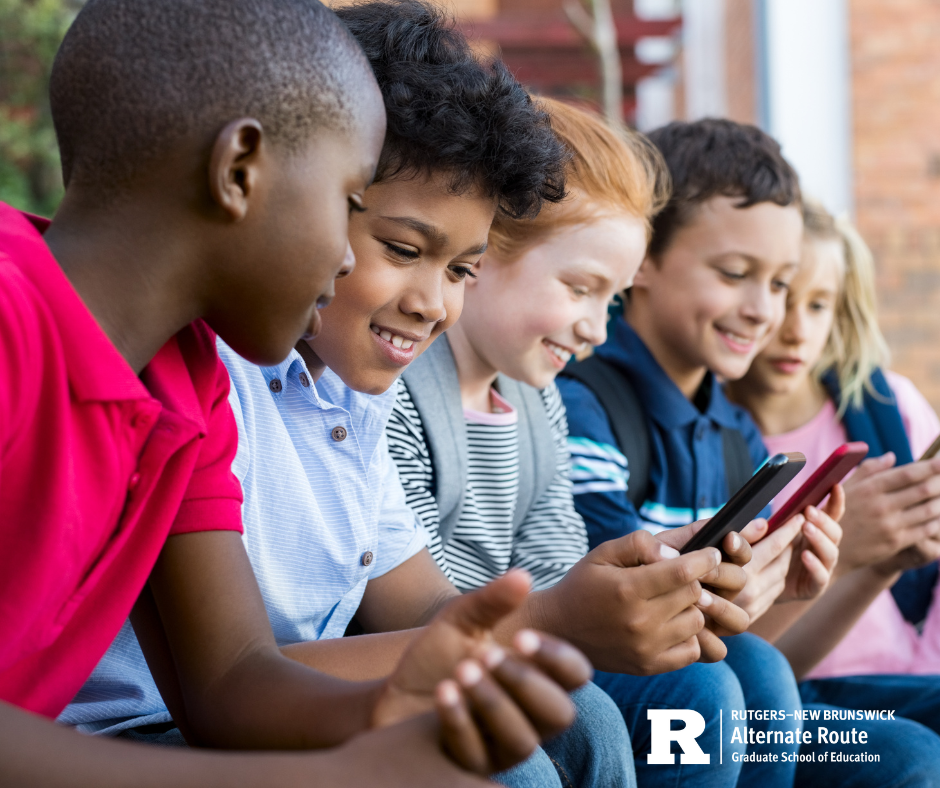Managing Distractions with Phones and Wearable Tech

Wearable technology is now in every classroom, whether teachers like it or not, and for many, this challenge is unknown territory—a frontier their predecessors could only imagine.
This once-uncharted landscape is now part of everyday life. On average, Americans spend four hours and 30 minutes on their smartphone, checking them 144 times a day. Mirroring these trends, nearly all (96%) teens use the internet every day, and 95% have access to a smartphone, up from 73% during the 2014-15 school year.
Smartphones have gone from a privilege to a necessity for youth. On average, children receive their first phone at 11, with almost all children having one by 15. Meanwhile, children eight and younger spend an average of two-and-a-half hours with screen media daily, with many (40%) two year olds having a tablet of their own.
“Ninety-one percent of teens use their cell phones simply as a way to pass the time, and over half of those teens say that they often use their cell phones this way,” Consumer Affairs reports. “More than 8 in 10 teens also report that they use their phones to connect with other people or learn new things, while half of teens use their devices for the exact opposite purpose, to avoid social interaction.”
Our society is embedded with wearable technologies like smartphones and watches, which also access the internet. As a result, classrooms have followed these trends, giving educators a new challenge to address, with half of school leaders (53%) reporting negative impacts on academic performance, mental health and attention spans.
How do educators navigate something so impermeable? Read on to learn.
New Jersey’s efforts to curb tech distraction in schools
State legislators across the United States have jumped into action to curb these distractions in schools. To date, 26 states have enacted cell phone bans, which prevent students from accessing phones and tablets during school hours.
New Jersey is one of the states without a ban. Instead, it has a bill.
Bill A4882 was reintroduced this year, with committee voting in favor. The legislation would require school districts to outline their policies and guidelines that limit cell phone and social media use in the classroom. More recently, the New Jersey Department of Education announced it will pay districts that ban smartphones during the school day for students in grades six through 12.
There is data to support banning cell phones, with a Florida school district seeing student scores increase 2-3% in the ban’s second year. Numbers also show fewer unexcused absences.
While support for these bans has grown over time, parental skepticism and concern exist. What is a distraction for teachers is a safety tool for parents. According to a National Parents Union survey, a large number of parents want their children to have their phones with them in case of an emergency at school.
There is also the side effect of increased suspensions for Black students. The increased student scores may look like a win for the aforementioned Florida school district; however, there was a short-term increase (16%) in suspensions for Black students.
Knowing this nuance, educators must enforce school phone bans with caution and empathy.
Strategies and resources for educators
Educators are tasked with covering new ground with limited resources. School cell phone bans solve one challenge but create another, as classroom management and student engagement strategies must be implemented to fill the gap these devices leave open.
Below, we’ve outlined professional development articles, plus examples of strategies that have worked for other educators.
Articles
The internet is limited in educator resources related to cell phone bans, which creates inefficiencies for teachers who want to center student wellness. We took the time to highlight the best the internet has to offer, creating a concise yet comprehensive list of resources.
4 Mistakes Educators Make Trying to Manage Cellphones in Schools
Making mistakes is one of the best ways to learn, and this article gathers four learning opportunities. Most importantly, it explains why these common mistakes aren’t effective and what to do instead.
A Community-First Approach to Cellphone Bans
We’re all in this together. That’s the message from this article, which shares how an involved community can support better smartphone etiquette.
Guiding Students to Develop a Clear Understanding of Their Cell Phone Use
This article outlines five strategies for educators, plus shares why the old way of doing things doesn’t align with our modern times.
How Do I Compete with Cell Phones for My Students’ Attention?
This teacher outlines how they navigate phone use and shares an impactful moment where phone distraction led to an opportunity to connect with and support students.
Managing Cell Phones in the Classroom
This guide uniquely recognizes the digital addiction associated with smartphones and introduces an approach inspired by harm reduction. Meant for academic instructors, this manual is also applicable to middle and high school classrooms.
Phones-Free Schools Movement
Mileva Repasky co-founded the Phone-Free Schools movement after she noticed her son’s relationship with phones. The organization provides a community for advocates, administrators and legislators to support phone-free environments in schools.
Educator opinions and advice
The best tips come from those doing the work, which is why online teacher forums provide additional insight that articles may not offer.
This Reddit post from six months ago addresses New Jersey’s efforts to address phones in classrooms and what the state’s educators think about potential legislation.
As a middle school teacher, I am giddy. I just hope parents start realizing the harm in cell phones and WAIT. Please just wait to give them a smartphone. Please. Don’t even give them tablets. Hope the next movement is screen-free until sixth grade. -Reddit user
I knew the tech was not healthy at a young age. But once I listened to a podcast about it changing the brain structure and the AI influence. I’m keeping it monitored as long as I can. -Reddit user
My school already does this, but it's not enough. These kids are addicted to their cell phones. If you're a parent, either don't give them a cell phone or make strict rules about what they can and can't download/view. -Reddit user
Teachers are also using the forum to swap stories, share advice and support one another. In this post, a teacher was notified about a school smartphone ban 11 days before the first day of school. Fellow teachers showed up with examples of successful methods.
…what I've seen work best is slow normalization, like establishing phone habits with students. If you can connect the no-phone rule to what the student gets (like meaningful discussion time or collaborative learning), they feel they have agency in the space. We should also lead by example, like if the adults in classrooms kept their own phones out of sight, then students would likely do the same. Both students and teachers are in this together. -Reddit user
I can speak as a teacher who has used pouches the last three years: they are amazing and you should have your school or your department pay for those pouches. -Reddit user
Some teachers at my school have started using phone lockers and they love them. Clear cubicles with individual keys. If the kid loses the key, the phone stays locked. Kids don't lose the keys. -Reddit user
We have a super strict no-phone policy. From day one (middle school), they’re told to keep their phones in their lockers all day. If we see it, we are taking it, regardless of whether or not they were using it. If you’re serious enough and actually do take the phones, they’ll take note. But EVERYONE needs to be on the same page. All it takes is the “cool teacher” allowing phones in their classroom, so now students think it’s okay everywhere. So just start strong and be consistent! -Reddit user
I was a substitute for an inner city high school. Serious cell phone policy. If it is out, the office confiscates it and a parent comes and picks it up. They are told (and probably sign a form) informing them that next time they can pick up the phone at the end of the school year. Mind you, as you enter campus and school, it is posted very visibly that student cell phones are banned on all school property during school hours. I had 2 kids break out their phones to charge. Told them to put them away. They refused. The Head of Discipline walked by my room and asked what I should do about the cell phones, and said he would take care of it. So he walked in, took the 2 phones and walked out without saying a word. I looked at the 2 kids and told them, "I gave you a chance." They just nodded and realized it was their fault. -Reddit user
Our school has had a cell phone ban for the last two years. I tell kids on day one, “If you forget it in your pocket, no harm, no foul, just leave it on my desk. If you use it in class, it’s going on my desk anyway and then the office.” I think I had five kids all year, put theirs on my desk and didn’t have to take one. I teach sixth grade, so it’s less of an issue. -Reddit user
One educator wanted to know effective strategies that don’t involve confiscating phones in this discussion.
One teacher I had would do one of two things. The first being emailing home and notifying the parents/guardians (even though he doubted they even checked), so if someone asked why so and so was failing, then he could say “I sent multiple emails in regards of [student] being distracted by their phone in class.” The second method was a pop quiz. Anytime he saw a phone out, he stopped what he was teaching and handed out the quiz. -Reddit user
I teach and model appropriate use. Phones are off and away during instruction unless part of the instruction. During work time, the screen must be visible- not necessarily that I have to see what's on it, but to show you're not hiding. If I allow little things, they generally don't fight me on bigger things. Overall, our workflow is on par with classes with zero tolerance. For the kids that aren't using their phones responsibly, I document each time and let them know I'm doing so. Often, I'll share my records with the kids that are struggling. "Look, when you come to me later in the semester asking why you're not passing, we'll reflect on this," indicating the long line of phone violations. If it becomes disruptive, I'll ask the kid to put it away or have them removed from the class. This is generally inappropriate picture taking, loud or inappropriate music, or behavior that impacts the learning of others. At this point, though, it's less of a phone issue than it is a behavior issue. -Reddit user
Doing projects that make their hands dirty. -Reddit user
Instead of deciding between a warning or confiscation, I'll flip a coin for the first one I see. Sometimes, I'll have a kid rat his friend out so we can "flip the coin." It deflects the blame to the coin, gives them a fair shot, and the kids like it. Sometimes they'll cheer, or if we're not rushed, I might offer a double or nothing bet. I teach 8th graders in a title I school and seems to work. -Reddit user
I had some success with taking the phone (only when a rule is broken), dropping it into a paper lunch bag, folding it up, and then wrapping copious amounts of duct tape around it. -Reddit user
Charging station. They plug them in and leave them. We also had a couple of parents get on board with using parental controls to block all apps during the school day. Kids could still call 911 or a parent, but couldn’t do anything else until the bell rang. -Reddit user
Sounds crazy, but keep them out of the chairs and on their feet. There was a small study referenced by Peter Liljedahl in his book talking about this. -Reddit user
I write their name on tickets if they keep it away during my instructional time and then do a drawing for prizes. I also give breaks and instruct/remind/reinforce that they are free to use their phones uninterrupted and unimpeded during the break. -Reddit user
If you’re considering following your dream of teaching, Rutgers Alternate Route can offer you the support and training you need to succeed. Be sure to follow Rutgers Alternate Route on Twitter and sign up for Alternate Route’s monthly newsletter for more information and stories from the field of education.

 Lindsay Patton is a digital communications professional who specializes in social media, writing, digital marketing, e-commerce, podcasting and other content-focused endeavors. Since 2019, she has assisted Alternate Route with its marketing strategy to help the program reach new audiences. As a result of this collaboration, Alternate Route has introduced Lindsay to many of New Jersey's talented educators, who have had a direct influence on her own classroom strategies as an adjunct professor. She is grateful for the opportunity to create meaningful content that helps increase equity within classrooms and is inspired by Alternate Route's hardworking team.
Lindsay Patton is a digital communications professional who specializes in social media, writing, digital marketing, e-commerce, podcasting and other content-focused endeavors. Since 2019, she has assisted Alternate Route with its marketing strategy to help the program reach new audiences. As a result of this collaboration, Alternate Route has introduced Lindsay to many of New Jersey's talented educators, who have had a direct influence on her own classroom strategies as an adjunct professor. She is grateful for the opportunity to create meaningful content that helps increase equity within classrooms and is inspired by Alternate Route's hardworking team. 





